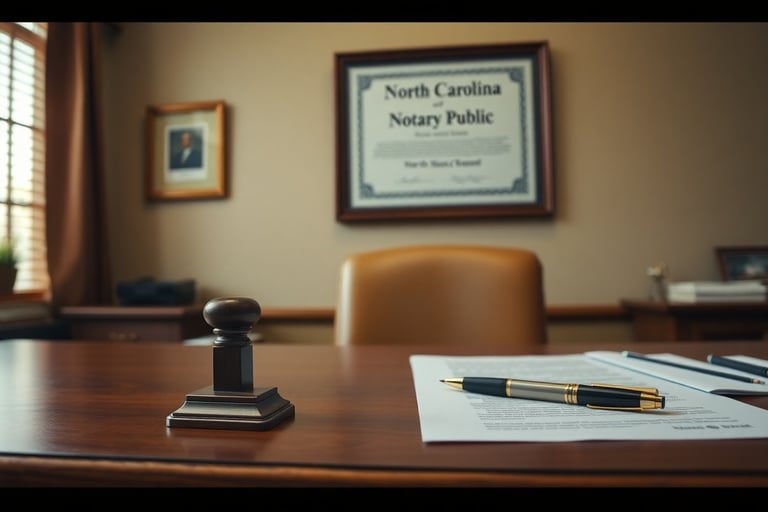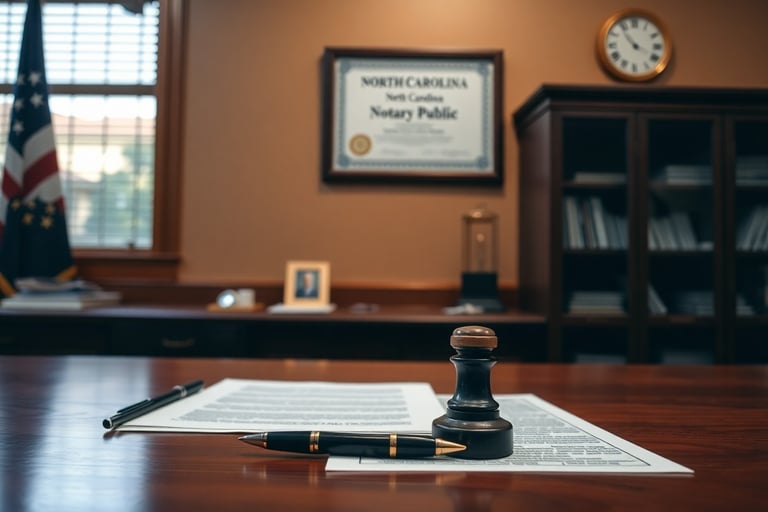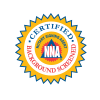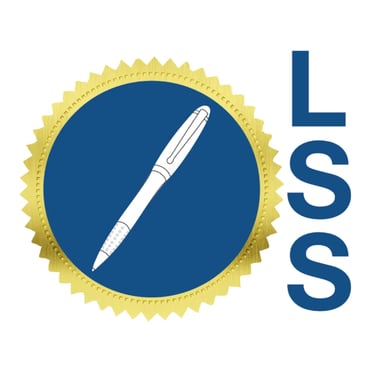What to Expect When Getting a Document Notarized in North Carolina
LOAN SIGNING SERVICES
Frank L Coxx
5/19/20256 min read
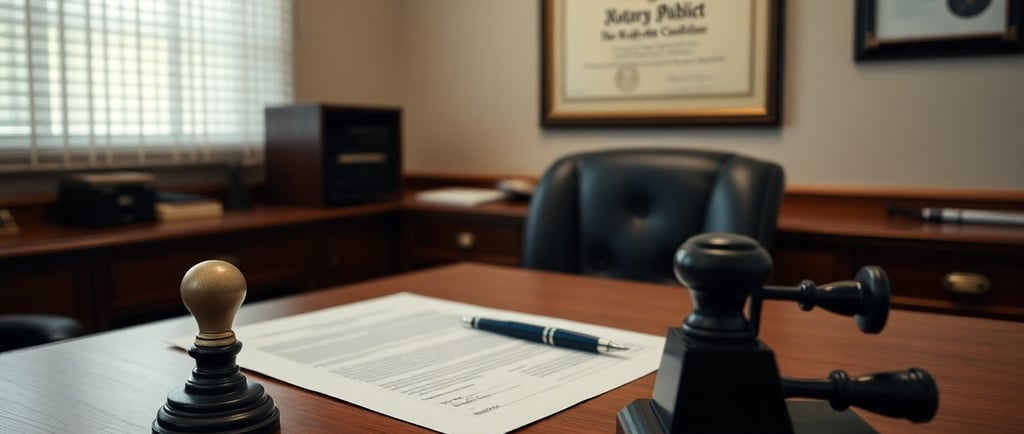

Notarization is an important step in legitimizing your documents, and understanding the process can make it smoother for you. In North Carolina, various documents may require notarization, including contracts, affidavits, and powers of attorney. As you navigate this procedure, you should be aware of the necessary steps, fees, and identification requirements to ensure a successful notarization. This guide will walk you through what to expect, helping you confidently approach your document notarization in the Tar Heel State.
Understanding Notarization in North Carolina
A notarization is an necessary legal process in North Carolina that involves a notary public verifying the identity of individuals signing documents. This crucial step helps prevent fraud and ensures that the documents are executed willingly and without coercion. Notarization enhances the authenticity of the documents involved and is often required for official transactions.
Definition of Notarization
An notarization is the act performed by a notary public to confirm the identity of the signers and witness their signatures on various documents. This process provides an added layer of security, ensuring that you are entering into an agreement knowingly and voluntarily.
Types of Documents Typically Notarized
The types of documents you may need to have notarized in North Carolina encompass a variety of legal matters. Here are some common examples:
Wills and Trusts
Powers of Attorney
Real Estate Transactions
Contracts and Agreements
Affidavits
Recognizing the importance of notarization for these documents can enhance their validity in legal contexts.
Document Type Description Wills Legal documents outlining your wishes for asset distribution after death. Powers of Attorney Documents that designate another person to make decisions on your behalf. Real Estate Transactions Documents pertaining to the buying, selling, or leasing of property. Contracts Agreements between parties that require formal acceptance. Affidavits Written statements confirmed by oath or affirmation.
Hence, the diversity of documents needing notarization is vast, reflecting different aspects of life and legal affairs. Examples include:
Loan Documents
Lease Agreements
Divorce Decrees
Medical Authorizations
Certification of Identity
Recognizing the specific requirements for these documents can help facilitate smoother transactions and legal proceedings.
The Role of a Notary Public
While a notary public serves as an impartial witness to the signing of important documents, their main responsibility is to deter fraud and ensure that the signatures on documents are authentic. By verifying the identities of the individuals involved and observing the signing process, a notary helps protect all parties against disputes that may arise later, offering peace of mind as you navigate various legal and financial transactions.
Qualifications and Responsibilities
Qualifications for becoming a notary public in North Carolina include being at least 18 years old, a resident of the state, and passing a background check. Notaries are responsible for verifying the identity of parties, administering oaths, and maintaining records of notarizations. You can expect a notary to fulfill these duties with integrity and professionalism, ensuring the validity of your documents.
Limitations of Notary Powers
Above all, it's crucial to understand that notaries have limitations concerning their powers and duties. They cannot provide legal advice, draft legal documents, or perform any actions related to the practice of law. Their role is strictly to verify identities and witness signatures, making it vital for you to seek appropriate legal assistance for any specific legal needs you may encounter.
For instance, if you need assistance with a complicated legal matter or require specific document language, a notary cannot help with that. Instead, you should consult an attorney or legal professional who can guide you through the intricacies of your situation. Notaries are there to ensure the integrity of the signing process, not to provide legal counsel or address complex legal issues.
Preparing for the Notarization Process
Now that you've decided to get your document notarized in North Carolina, it's important to prepare adequately. Understanding the requirements and gathering necessary materials will make the notarization process smooth and efficient. You’ll want to ensure you have the right identification and that your document is fully ready for review by the notary.
Required Identification
About the identification needed for notarization, North Carolina requires you to present a valid form of ID. This can include a government-issued photo ID, such as a driver’s license or passport. Make sure that your ID is current and easily recognizable to the notary to avoid any delays.
Document Readiness
About document readiness, you should have the document prepared and signed in the appropriate areas as specified. The notary will not advise you on the content of the document but will verify that you are signing it willingly and that it meets the necessary criteria for notarization.
At this stage, it’s vital to review your document carefully to ensure all required signatures are in place and that it is complete. If a document has blanks or incomplete sections, it may not be eligible for notarization. Take time to check for accuracy and clarity, as this will help the process go smoothly when you meet with the notary.
The Notarization Process
To get a document notarized in North Carolina, you will work with a notary public, a trained individual authorized to verify the authenticity of signatures and documents. The process generally involves presenting your identification, signing the document in the presence of the notary, and allowing them to complete the notarization by applying their official seal. Understanding this process will contribute to a smooth and efficient experience.
Steps Involved
Above, the notarization process includes key steps you need to follow: gather your necessary documents, identify the notary, present valid identification, sign the document in front of the notary, and finally, ensure the notarization is completed with the official seal and signature.
Fees and Charges
Behind the notarization process, you should also consider the fees and charges involved, which can vary depending on the notary and the complexity of the document being notarized.
In fact, the cost for notarization in North Carolina can range from $5 to $10 per signature, depending on the notary's fees and specific services required. Some notaries may charge additional travel fees if they come to your location, while others might offer discounts for multiple documents. It is advisable to inquire about the total cost upfront to avoid any surprises during your notarization experience.
After the Notarization
Keep your notarized document in a safe place. Once your document has been notarized, it is legally binding, so ensure that you store it securely to prevent any alterations or damage. If you require additional copies, consider making certified copies, which may be requested through the notary or the relevant office where the notarization took place.
Document Storage and Copying
About storing your notarized documents, it is wise to keep them in a dry, secure location. Make sure to label and organize these documents, especially when you have multiple notarized items. If additional copies are needed, you can ask the notary for certified copies, ensuring they maintain the integrity of the original document.
What to Do if a Mistake Occurs
Behind every notarization is a commitment to accuracy, yet mistakes can occur. If you discover an error on your notarized document, act promptly to address it. Contact the notary who performed the notarization to discuss the error and request a correction, or a new notarization if necessary.
Even minor mistakes can lead to complications down the line, so it’s best to handle them swiftly. Reach out to the notary immediately; they might be able to rectify the issue by issuing a new notarization or providing a correction document. If the notary is unavailable, consult a legal professional for guidance on the next steps for resolving any discrepancies in your notarized document.
Common Questions and Concerns
Once again, many individuals have questions and concerns when getting a document notarized in North Carolina. It’s common to wonder about the fees, identification requirements, or the notarization process itself. Being informed and prepared can alleviate much of the anxiety surrounding this important legal step, allowing you to approach the process with confidence.
FAQs about Notarization
Any questions you have about notarization can usually be addressed with some basic research. Common inquiries include what types of documents need notarization, how much it will cost, and whether you need to be present when your document is notarized. Understanding the specifics can help you navigate the process smoothly.
Misconceptions about Notaries
Misconceptions about notaries often lead to confusion regarding their role and responsibilities. Many people mistakenly believe that notaries verify the content of documents or approve them as valid. In reality, notaries serve as impartial witnesses to the signing of documents, ensuring that signers understand what they are signing and that the signature is genuine.
Consequently, it’s important to clarify what notaries can and cannot do. They are not legal advisors or document creators; their responsibility is limited to identification verification and witnessing signatures. By understanding these limitations, you can avoid unnecessary misunderstandings and engage effectively with notary services when needed.
To wrap up
Considering all points, when getting a document notarized in North Carolina, you can expect a straightforward process that requires valid identification and the presence of all signers. It's important that the document is complete, as any errors or omissions might lead to delays. Be prepared to pay a nominal fee for the notary services, which can vary. Lastly, ensure that you understand the purpose of the notarization, as it serves to affirm the authenticity of your signature and the integrity of the document.
